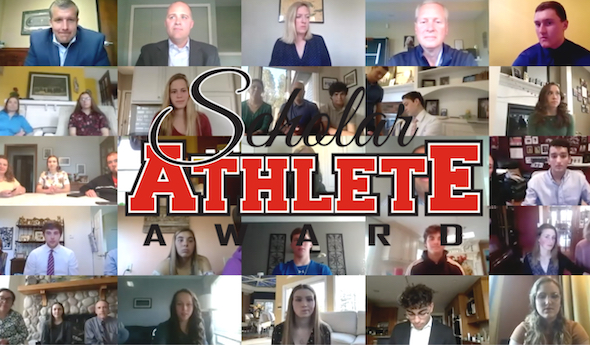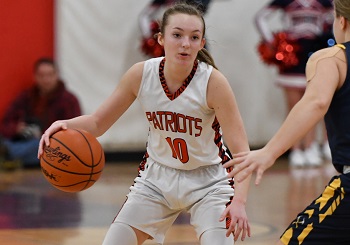
Study: Single-Sport Athletes Injured More
November 3, 2016
A study conducted by the University of Wisconsin School of Medicine and Public Health and funded by the National Federation of State High School Associations (NFHS) Foundation revealed that high school athletes who specialize in a single sport sustain lower-extremity injuries at significantly higher rates than athletes who do not specialize in one sport.
The study was conducted throughout the 2015-16 school year at 29 high schools in Wisconsin involving more than 1,500 student-athletes equally divided between male and female participants. The schools involved in the study represented a mixture of rural (14), suburban (12) and urban (3) areas, and enrollments were equally diverse with 10 small schools (less than 500 students), 10 medium schools (501-1,000 students) and nine large schools (more than 1,000 students).
Athletes who specialized in one sport were twice as likely to report previously sustaining a lower-extremity injury while participating in sports (46%) than athletes who did not specialize (24%). In addition, specialized athletes sustained 60 percent more new lower-extremity injuries during the study than athletes who did not specialize. Lower-extremity injuries were defined as any acute, gradual, recurrent or repetitive-use injury to the lower musculoskeletal system.
“While we have long believed that sport specialization by high school athletes leads to an increased risk of overuse injury, this study confirms those beliefs about the potential risks of sport specialization,” said Bob Gardner, NFHS executive director. “Coaches, parents and student-athletes need to be aware of the injury risks involved with an overemphasis in a single sport.”
Among those who reported previously sustaining a lower-extremity injury, the areas of the body injured most often were the ankle (43%) and knee (23%). The most common types of previous injuries were ligament sprains (51%) and muscle/tendon strains (20%).
New injuries during the year-long study occurred most often to the ankle (34%), knee (25%) and upper leg (13%), with the most common injuries being ligament sprains (41%), muscle/tendon strains (25%) and tendonitis (20%).
In addition, specialized athletes were twice as likely to sustain a gradual onset/repetitive-use injury than athletes who did not specialize, and those who specialized were more likely to sustain an injury even when controlling for gender, grade, previous injury status and sport.
Thirty-four (34) percent of the student-athletes involved in the Wisconsin study specialized in one sport, with females (41%) more likely to specialize than males (28%). Soccer had the highest level of specialization for both males (45%) and females (49%). After soccer, the rate of specialization for females was highest for softball (45%), volleyball (43%) and basketball (37%). The top specialization sports for males after soccer were basketball (37%), tennis (33%) and wrestling (29%).
The study, which was directed by Timothy McGuine, Ph.D., ATC, of the University of Wisconsin, also documented the effects of concurrent sport participation (participating in an interscholastic sport while simultaneously participating in an out-of-school club sport), which indicated further risk of athletes sustaining lower-extremity injuries.
Almost 50 percent of the student-athletes involved in the survey indicated they participated on a club team outside the school setting, and 15 percent of those individuals did so while simultaneously competing in a different sport within the school. Seventeen (17) percent of the student-athletes indicated that they took part in 60 or more primary sport competitions (school and club) in a single year. Among those student-athletes in this group who sustained new lower-extremity injuries during the year, 27 percent were athletes who specialized in one sport.
The student-athletes involved in the study were deemed “specialized” if they answered “yes” to at least four of the following six questions: 1) Do you train more than 75 percent of the time in your primary sport?; 2) Do you train to improve skill and miss time with friends as a result?; 3) Have you quit another sport to focus on one sport?; 4) Do you consider your primary sport more important than your other sports?; 5) Do you regularly travel out of state for your primary sport?; 6) Do you train more than eight months a year in your primary sport?
Although some sports (field hockey, lacrosse) are not offered in Wisconsin and were not included in the study, the study concluded that since specialization increased the risk of lower-extremity injuries in sports involved in the survey it would also likely increase the risk of injuries in sports that were not a part of the study.

2020 Class Honored Together, from Afar
By
Geoff Kimmerly
MHSAA.com senior editor
May 15, 2020
Ishpeming Westwood’s girls basketball team was two hours into a three-hour trip to its Division 3 Regional Final on March 12 when the Patriots were told to turn the bus around and come home.
In an instant, the 2019-20 school year – and with it all MHSAA sports across the state – had come to a halt. And two months later, the high school world and its sports community continue to wait for bits of normalcy to return.
On Wednesday, we were able to enjoy a little bit of normal that’s been part of the annual MHSAA calendar for three decades. A Zoom call brought together 31 families from all over the state along with MHSAA staff and Farm Bureau Insurance CEO Don Simon to celebrate this year’s MHSAA/Farm Bureau Insurance Scholar-Athlete Award winners.
Living rooms, kitchens and home offices replaced Breslin Center as settings for this “virtual” ceremony. And yet, this ceremony may be remembered more than any other because of its necessity – due to the COVID-19 pandemic – and because of how it brought so many together, remotely, while the coronavirus has forced all of us to remain apart.
Below is the ceremony, in full, including words from Simon, MHSAA Executive Director Mark Uyl and Assistant Director Andy Frushour and, for the first time, a student speaker from the class – Ishpeming Westwood senior Madelyn Koski, who was part of that basketball team destined for Sault Ste. Marie. A brief Q&A with Koski follows.
Koski was an all-stater on the court who would’ve finished her high school career with four varsity letters each for hoops, tennis and softball. She will continue at Ferris State University, where she’ll pursue a degree in pharmacy and continue her basketball career.
Second Half: How did you decide what you wanted to say? Was there a message you wanted to get across?
It was easy to write the sad part, because I know what happened – I was there. But it was hard for me to make a positive spin at the end because I don’t think anyone’s over it yet. I was glad to be able to turn it into something that was bigger than sports … more about our whole lives and less about our time in high school.
Second Half: It’s been two months. How have you been navigating the disappointment, the sadness? And is there advice you’d give to other people your age trying to do it?
As time went on, it got a little bit better. The day after was pretty sad; that’s all I could think about. Now there’s so many other things to do – the weather’s nicer, we can go outside. And I’m playing college basketball – not everyone has that chance – but at least I have that to practice for, look forward to.
I guess, it’s just … time heals.
Second Half: Even though you can’t be with them and hang out with them, I’m sure you’re talking a lot of your friends and teammates. What kind of conversations are you having? Is it looking ahead? Is it still thinking about, “We’d be playing softball right now?"
I think we kinda tried to leave the basketball stuff in the past because it was too sad to talk about. We made sure we do talk, obviously not in person, but on social media or FaceTime, we just talk about our memories and everything. That helped. It didn’t close the chapter, but it was nice to talk to them when we were all alone. And now we just don’t talk about that anymore. Nobody really wants to talk about it. We see memories popping up on Facebook and all these other things about, “Oh, we had a softball game last year at this time.” And it’s pretty sad. But no one else is playing. So it’s like we’re all in the same boat.
 Second Half: You can turn on the news and you can see what every adult has to say about what’s going on right now. … You’re 17, you’re finishing your last year of high school, you’re going through something no one has gone through in more than 100 years. How do you see everything that’s happening in the world right now, as you look at it from a 17-year-old’s point of view and see seasons end and school end?
Second Half: You can turn on the news and you can see what every adult has to say about what’s going on right now. … You’re 17, you’re finishing your last year of high school, you’re going through something no one has gone through in more than 100 years. How do you see everything that’s happening in the world right now, as you look at it from a 17-year-old’s point of view and see seasons end and school end?
I know we can’t help what happened. But obviously I think it’s unfair that it happened to our class. It stinks for every grade, but (as seniors) we’re missing out on our best parts of high school right now and it’s pretty horrible. We’ve been waiting years for our senior proms and graduations, banquets and award ceremonies, like the MHSAA one. So that kinda stinks.
Ever since March 12, I’ve been staying optimistic. But I’m proved wrong every time because things just keep getting canceled and canceled. … (But) I’m a pretty optimistic person, so I still have some left.
Second Half: What happens next? What does your summer look like? What happens for people who are in your shoes?
I’ll keep working out, and one of the girls on my high school basketball team is going to play at Michigan Tech so (eventually) we can work out together. … I think the biggest thing to do this summer, that I think I’ll do, is appreciate time with my family. I have gotten to spend a lot of time with them. And then maybe once summer rolls around and we’re allowed to be in bigger groups, I’ll be able to be with people other than my mom and dad, like my grandparents and cousins and my aunts and uncles. … (My sister Jillian and I) have been playing the same varsity sports for the last couple of years, and she’s been really successful. It’s been fun to win all these championships and stuff with her.
Second Half: What do you think you’re going to remember from this in five years, 10 years, when people ask you what your experience was like?
I’m probably going to say it’s a pretty bad experience. I guess it was an eye-opener that life can change at any moment. That’s kind’ve it. It didn’t change in a good way.
PHOTO: Westwood's Madelyn Koski sets up a play as Negaunee's Breanne Giotto defends her during their Jan. 24 game. (Photo by Cara Kamps.)

